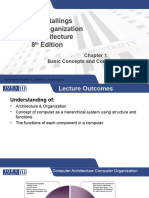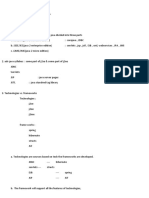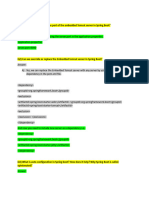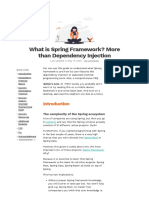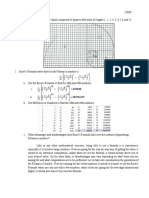DurgaSoft Java
Uploaded by
SANKET BASU ROYDurgaSoft Java
Uploaded by
SANKET BASU ROYAccess Modifiers & declaration
> A java source file can contain any number of class & java source file
can be any name.
> A java Source file can contain Atmost one public class. if
the source file have any public class then name should be same
as public class otherwise we will get compile time error saying
case 1: if there is no public class we can give any name to java
source file .
case 2: if there is one class(ex-class B) declared as public
then the name of the public class & name of the java
program (java source file)should be matched otherwise we will get
compile time error saying "class B is public, should be declared
in file named B.java"
case 3:if class B & C are public and the program name is B.java
then also we will get a compile type error saying
"class C is public, should be declared in file named C.java"
> if the class does not contain main method then we will get
runtime excepton saying "NoSuchMethodError:main"
> if we are trying to execute a java class and corresponding
.class file is not available we will get a runtime exception
saying "NoClassDefFoundError:main"
we can resolve the Problem (ArrayList l=new ArrayList();)
by using fully Qualified Name(java.util.ArrayList al=new java.util.ArrayList()
)
for problem is that using fully qualified name everytime is it
increases the length of the code so it decreases the
readability of code. we can resolve nthis problem by using
import statement.
> two types of import statement
1.explicit class import
2.implicit class import
Explicit class import:
ex- java.util.ArrayList. it increases the readability of code.
Implicit class import:
ex-java.util.*; it decreases the readabilty of code.
In java there are two case where we get Ambiguity problem
in Case of Date & List.
Date are in present in java.util package and in java.sql
List are in present in java.util package and in java.awt package.
while resolving class names, compiler always give the
presedence in following order.
1.Explicit class import
2.Class present in current working directory (default package)
3.Implicit class import
fully qualified statements take less time to compile but short names with
import statement take more time both case have same execution time.
diff b/w #include in c & import statement in java
in C language #inclue all the header files loaded at the time of include
statement.---- static loading
in java there is no .class will loaded at the time of import statement
.class fill will loaded whenever we are using particular class then
corresponding class will be loaded-- dynamic loading or load on demand
12441559611719
You might also like
- Apache Cassandra Administrator Associate - Exam Practice TestsFrom EverandApache Cassandra Administrator Associate - Exam Practice TestsNo ratings yet
- Lecture 1 Introduction To Computer Architecture and OrganizationNo ratings yetLecture 1 Introduction To Computer Architecture and Organization69 pages
- SBI Systems and IT Officer Model Questions Computer Networks MCQ100% (2)SBI Systems and IT Officer Model Questions Computer Networks MCQ220 pages
- Interview Question Collection Framework PDFNo ratings yetInterview Question Collection Framework PDF13 pages
- Spring Boot - H2 DB Spring Boot - JPA+H2 DB: Page 1 of 15No ratings yetSpring Boot - H2 DB Spring Boot - JPA+H2 DB: Page 1 of 1515 pages
- Adv - Java GTU Study Material Presentations Unit-6 Hibernate 4.0No ratings yetAdv - Java GTU Study Material Presentations Unit-6 Hibernate 4.060 pages
- Java Means Durga Soft: DURGA SOFTWARE SOLUTIONS, 202 HUDA Maitrivanam, Ameerpet, Hyd. PH: 040-64512786No ratings yetJava Means Durga Soft: DURGA SOFTWARE SOLUTIONS, 202 HUDA Maitrivanam, Ameerpet, Hyd. PH: 040-6451278619 pages
- Training Spring Batch: Presenter Name: Nguyen Le Ngoc Ha Presentation Date: 30/10/20140% (1)Training Spring Batch: Presenter Name: Nguyen Le Ngoc Ha Presentation Date: 30/10/201416 pages
- 1.1 Try With Resources Enahancements PDFNo ratings yet1.1 Try With Resources Enahancements PDF6 pages
- Java by Venkatesh Maipathi Sir Upto 13-04-2023No ratings yetJava by Venkatesh Maipathi Sir Upto 13-04-202391 pages
- 462 Solution Code Spring Security Demo 08 JDBC PlaintextNo ratings yet462 Solution Code Spring Security Demo 08 JDBC Plaintext14 pages
- Building JSP Pages Using The Expression Language (EL)No ratings yetBuilding JSP Pages Using The Expression Language (EL)30 pages
- Java Interview Questions For 2 Years ExperiencedNo ratings yetJava Interview Questions For 2 Years Experienced8 pages
- Index of Programs: S. No Program Name Page NoNo ratings yetIndex of Programs: S. No Program Name Page No28 pages
- The Datadog Handbook: A Guide to Monitoring, Metrics, and TracingFrom EverandThe Datadog Handbook: A Guide to Monitoring, Metrics, and TracingNo ratings yet
- C# - How To Check If Date Is Less Than or Equals To Today's Date - Stack OverflowNo ratings yetC# - How To Check If Date Is Less Than or Equals To Today's Date - Stack Overflow4 pages
- Alliance Retail Banking Application: Devoloped By-Anwesh MondalNo ratings yetAlliance Retail Banking Application: Devoloped By-Anwesh Mondal14 pages
- Wbcs Prelims 2019 Solved Answers by Go For GloryNo ratings yetWbcs Prelims 2019 Solved Answers by Go For Glory10 pages
- WBCS - 2019 Preliminary Answer Key Prepared by Competitive Career Guidance, Chinsurah, HooghlyNo ratings yetWBCS - 2019 Preliminary Answer Key Prepared by Competitive Career Guidance, Chinsurah, Hooghly11 pages
- Nitescu Dorin Florian Architecture PortfolioNo ratings yetNitescu Dorin Florian Architecture Portfolio12 pages
- Fujitsu Lifebook LH520 (Quanta FK1) Laptop Schematics - Quanta - fk1No ratings yetFujitsu Lifebook LH520 (Quanta FK1) Laptop Schematics - Quanta - fk137 pages
- Professional Teacher - Secondary (Social Studies)No ratings yetProfessional Teacher - Secondary (Social Studies)64 pages
- 2-Storey With Roof Deck Apartment BuildingNo ratings yet2-Storey With Roof Deck Apartment Building4 pages
- The Transition of Croatian Seaports Into Smart Ports - MIPRO 2019 Saša AksentijevićNo ratings yetThe Transition of Croatian Seaports Into Smart Ports - MIPRO 2019 Saša Aksentijević5 pages
- Android Application To Convert Speech To Text andNo ratings yetAndroid Application To Convert Speech To Text and5 pages
- Instructions - Fortigate Cli Reference Mr6100% (5)Instructions - Fortigate Cli Reference Mr614 pages
- Servlet Is JSP Is: HTML in Java Java in HTMLNo ratings yetServlet Is JSP Is: HTML in Java Java in HTML3 pages
- Visual Studio - Why Am I Getting - Cannot Connect To Server - A Network-Related or Instance-Specific Error - Stack OverflowNo ratings yetVisual Studio - Why Am I Getting - Cannot Connect To Server - A Network-Related or Instance-Specific Error - Stack Overflow25 pages
- Mobile Charging Station Placements in Internet of Electric Vehicles A Federated Learning ApproachNo ratings yetMobile Charging Station Placements in Internet of Electric Vehicles A Federated Learning Approach17 pages

